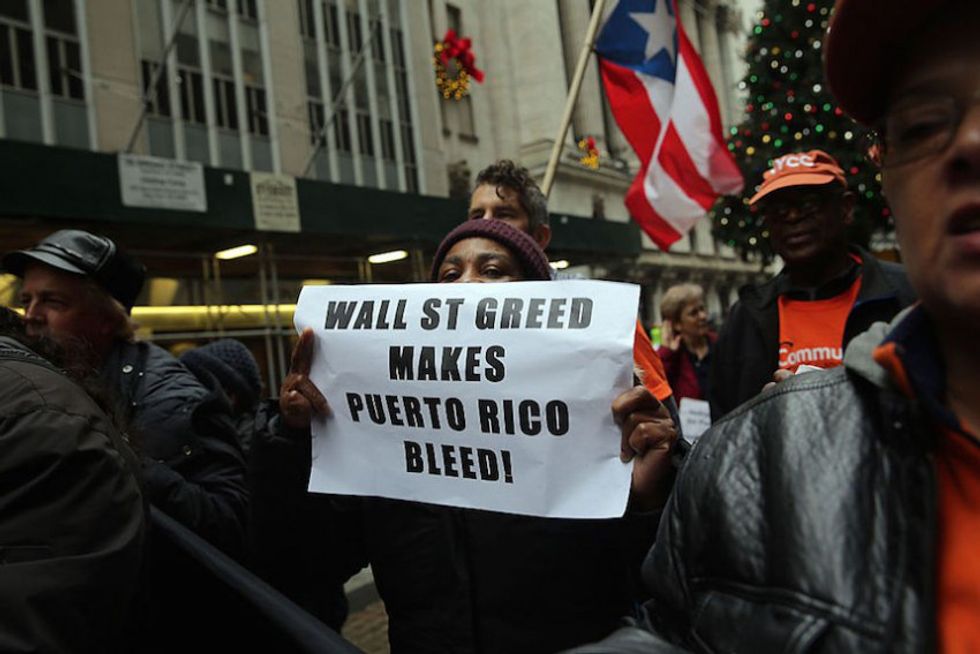These last few months have proved challenging for Puerto Rico. However, their current situation has been escalating for the past two decades. The largest U.S territory is in a state of crisis, and it is suffering. The people are demanding real humane solutions from Washington D.C while others are fleeing the small island hoping for a better life in the U.S, others are demanding those who put Puerto Rico in the state it is in to take responsibility, and supports are growing for Puerto Rico to become a state. What exactly is it that's happening in Puerto Rico, the small island that's known to many as an escape from the mainland's troubles and worries? An island surrounded by toasty sandy beaches, and heavenly seafood? DEBT. The crisis Puerto Rico is in has already threatened education, homes, pensions, healthcare, jobs, hospitals, and the livelihood of all of Puerto Rico's citizens.
Puerto Rico owes a little over 70 Billion dollars in debt. Although that number is next to nothing compared with the United States' 19.3 trillion, keep in mind it is only a small island inhabited by about 3.5 million humans and, about 40 percent of the island's population is unable to work due to businesses finding little benefits to hiring employees, and employees having no benefits and competition being low. Poverty is at an all time high.
Looking at the island's situation, it is unclear as to why the government kept its debt growing and growing until the last straw broke the camel's back, and then more straws kept on being added, until the camel could no longer stand let alone walk. After thorough investigations however, it seems clear that despite the government being at the crux of the problem, one body is also to blame. That body is made up of greedy wall street corporations who smelled blood on the horizon, and sensed that Puerto Rico would keep on demanding bonds with high interests out of desperation, and in turn their debt would skyrocket. In short, Wall Street would have a big payday. Democracynow calls it " a payday lending scheme".
In an article published last December, it was revealed that it is nearly impossible to understand the scope of the scheme. Reports by the Fitch Agency ( nationally recognized statistical rating organization) have come out claiming that at first, these vultures owned 24 percent of the debt in August 2014, and in June 2015 it rose to close to 50 percent. Democratic Lydia Vasquez of New York stated that this industry "operates largely in the shadows". Even when Puerto Rico hired Bondcom to pinpoint who exactly their debt holders were, their names were not released. It took press reports, off the record conversations, and document to identify only 36 bond holders by the Center for Investigative Journalism, and later more media reports to complete a list of 44 firms. Truly these firms went out of the way to remain in the shadows for as long as possible, manipulating the outcome of Puerto Rico.
All of these firms stand to benefit regardless whether Puerto Rico is able to pay them their billions. Last year Prospect stated, "The Ad Hoc Group of reportedly 34 hedge funds owns about $4.5 billion" from constitutionally guaranteed municipal bonds. The Puerto Rico Electric Power Authority Group "has holdings in the Electric Power Authority", while three firms have authority over almost all the debt in the Aqueduct and Sewer Authority. Finally, others stand to benefit from the Government Development Bank and COFINA. According to Wikipedia, COFINA known as the Puerto Rico Urgent Interest Fund Corporation, is a government owned corporation, and a subsidiary of the Government Development bank. COFINA exists to structure Puerto Rico's financial situation mostly by supplying government bonds (Puerto Rico Sales Tax Revenue Bonds) to fund the public debt.
Despite claims made by the firms in public stating that Puerto Rico's financial situation is able to come to a close as long as they payback their debt (??), they are making use of every available resources to ensure that it won't be years away from ever happening. From lobbying to Congress to prevent Puerto Rico access to chapter 9 bankruptcy act to overturning a Puerto Rican law that would have enabled public corporations to refinance their debt. Their political prowess renders them formidable. The Washington Post questioned whether Puerto Rico is "an important test of whether Washington is, as some allege, controlled by financial interests". These deep ties in Washington D.C are made clear because they are being protected, and no justice for the way the firms crushed the island will ever be served.
In the meantime keep a lookout for the Refund America project, and read the "Puerto Rico's Payday Loans" report. As the weeks progress, I will be investing time looking more into just how much the hedge funds are being protected, talk about the different hedge funds and their involvements in similar schemes, as well as PROMESA.

























